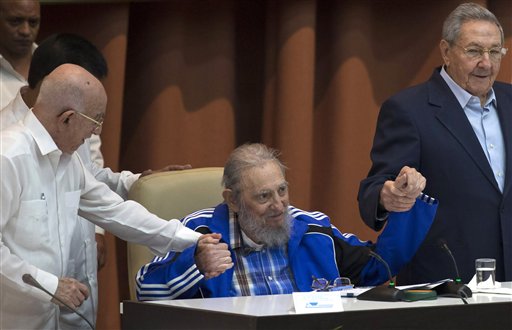State media: Raul Castro retains top Communist Party post

Fidel Castro sits as he clasps hands with his brother, Cuban President Raul Castro, right, and second secretary of the Central Committee, Jose Ramon Machado Ventura, moments before the playing of the Communist party hymn during the closing ceremonies of the 7th Congress of the Cuban Communist Party, in Havana, Cuba, Tuesday, April 19, 2016. Ismael Francisco/Cubadebate via AP
HAVANA — Raul Castro will hold the Cuban Communist Party’s highest post for another five years alongside his hardline second-in-command, state media reported Tuesday, in a resounding message that the island’s aging revolutionary leaders will retain control in the face of detente with the United States and widespread popular dissatisfaction with the country’s economic performance.
Government news sites said Castro, 84, would remain the party’s first secretary and Jose Ramon Machado Ventura would hold the post of second secretary for a second term. Castro currently is both president and first secretary. The decision means he will hold a position at least as powerful as the presidency even after stepping down from that post in 2018.
Machado Ventura, 85, is known as an enforcer of Communist orthodoxy and voice against some of the country’s biggest recent economic reforms.
Castro’s decision to remain in power alongside a man even he has criticized for rigidity capped a four-day meeting of the Communist Party notable for its secrecy and apparent lack of discussion about substantive new reforms to Cuba’s stagnant centrally planned economy. Even high-ranking government officials had speculated in the weeks leading up the Seventy Party Congress that Machado Ventura could be replaced by a younger face associated with free-market reforms started by Castro himself.
The party congress also chose the powerful 15-member Political Bureau, mostly devoid of fresh faces associated with the party’s younger generations. Five members were new but none are high-profile advocates for reform.
Article continues after this advertisementA physician by training, Machado Ventura organized a network of rebel field hospitals and clinics in the Sierra Maestra mountains in the 1950s, participating in combat as both a medic and a fighter under Castro in the revolution against dictator Fulgencio Batista. After the revolution he became health minister and later assumed more political roles within the Communist Party. He also sat on the powerful Politburo starting in 1975.
Article continues after this advertisementMachado Ventura was vice president from Raul Castro’s ascent in 2008 until 2013, when the post was taken by Miguel Diaz-Canel, widely seen as the country’s likely next president. Machado Ventura was named second secretary in 2011 in a move seen as a way to placate and empower party hardliners.
Machado Ventura was often employed by Raul Castro and his brother Fidel to impose order in areas seen as lacking discipline, most recently touring the country to crack down on private sellers of fruits, vegetables and other agricultural goods. While Raul Castro opened Cuba’s faltering agricultural economy to private enterprise, the government blames a new class of private farmers and produce merchants for a rise in prices.
Machado Ventura has been the public face of crackdown on what the government labels profiteering, but many outside economists say the problem is farms’ inability to meet demand due to continued state control of supplies of machinery, fertilizers and other inputs.
“He’s demanding! He’s very demanding!” Castro said of his deputy in 2008. “To be sincere, sometimes I’ve said it personally, he doesn’t use the best techniques in being demanding.”